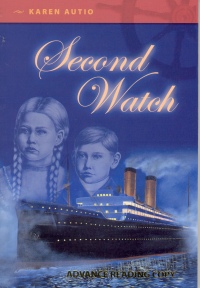| ________________
CM . . .
. Volume XII Number 1 . . . .September 2, 2005
excerpt:
Second Watch is historical fiction. While Saara and her family are fictional, author Karen Autio notes that she attempted to ensure the accuracy of the times and events recounted in the novel. The story begins with a prologue: Saara gives her great granddaughter, Alissia, a special silver spoon that she has had since she turned twelve. Coincidentally, this spoon was on the last voyage both of the Titanic and the Empress of Ireland. When Alissia learns that this is the spoon from the Empress of Ireland, she asks her great-grandmother to tell the whole story of her fateful trip. Saara starts her tale a few months before the trip began. Back in 1914, 11-year old Saara lived with her mother, father, and eight-year-old brother, Jussi, in Port Arthur (now part of Thunder Bay), ON. For a long time, she had been hoping to visit Finland, the country from which her parents had emigrated a couple of years before her birth. Upon hearing that her grandmother's health was failing, Saara, along with her mother, doubled their efforts to save money for the trip, despite the fact that Sarah's father might be going on strike and believed that they should be saving to buy a house, rather than to visit the "old" country. As her father's work situation changed from bad to worse, Saara's relations with him became strained. Saara's best friend at the time was 13-year old Helena. When it appeared that Helena preferred the company of a "snobby" 13-year-old new immigrant, Saara decided to ignore Helena. Finally with Saara's help her mother managed to save enough for the trip to Finland. By the time they left Port Arthur in May, 1914, Saara was barely speaking to her father or Helena. After a train ride to Quebec, Saara, her mother and brother boarded the Empress of Ireland. The first night they were underway, a coal ship struck the Empress of Ireland amidships. Saara became separated from her mother, but she managed to hold onto her brother until they were rescued from the icy water of the St. Lawrence River. Eventually, the entire family was miraculously re-united. When Saara returned to school, she got her old friend Helena back and reconciled with her father. Karen Autio's well-written first novel grew out of her Finnish grandmother's gift of a silver spoon with a tale attached. While the prologue of Second Watch is clearly meant to set the scene, it actually becomes part of Chapter One's scene:
Once Saara's tale is finished, this reader would have liked the author to revisit the ancient Saara and her great granddaughter. Instead, the story ends on Saara's twelfth birthday. All of the central characters in Second Watch are well rounded and convincing, although at times the dialogue is somewhat stiff. Saara's mother and father are going through a stressful time, which each views from her/his own believable, though different, perspectives. Jussi can be a typically annoying little brother, but he also "could be pleasant when he tried." Saara, who acts as the interpreter for her Finnish-speaking mother, shows ingenuity and determination in her attempts to help raise money for the trip. For instance, in hopes of getting some promised reward money, Saara searches for and finds a missing horse. In her interaction with her father and Helena, one sees her strong will and a stubborn streak. These characteristics serve her well, especially when the ship goes down and later, when she and her father are searching the hospitals for her mother and Jussi. Saara's description of the rugged landscape along the north shore of Lake Superior, as seen from the train, is vivid and alluring. Amongst other historical details, the story touches on suffragettes, labour unions, and the lives of Canada's Finnish immigrants. A "historical note" at the end of the book (including old photographs) briefly discusses why they settled in the Thunder Bay area at the beginning of the twentieth century and gives more details about the 465 survivors of the Empress of Ireland's 1,477 passengers. While young readers will find that many things have changed since 1914, they may also be surprised by the number of things that have not really changed, such as family dynamics and the experiences of new immigrants to Canada. Recommended. Karen Rankin of Toronto, ON, is writer and editor of children's stories.
To comment
on this title or this review, send mail to cm@umanitoba.ca.
Copyright © the Manitoba Library Association. Reproduction for personal
use is permitted only if this copyright notice is maintained. Any
other reproduction is prohibited without permission.
NEXT REVIEW |
TABLE OF CONTENTS FOR THIS ISSUE
- September 2, 2005.
AUTHORS |
TITLES |
MEDIA REVIEWS |
PROFILES |
BACK ISSUES |
SEARCH |
CMARCHIVE |
HOME |
